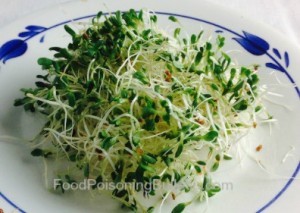An E. coli O157:NM outbreak in Minnesota and Wisconsin had been linked to alfalfa sprouts made by Jack and the Green Sprouts in River Falls, Wisconsin. The outbreak has sickened at least nine people so far. Two of those sickened have been hospitalized.
 The sprouts have been recalled and hopefully there will be no new illnesses reported. But there will be more recalls and outbreaks involving sprouts in the future, because these products are inherently risky. Just browse through all of the stories of recalls and outbreaks we’ve written about in the past four years. What is it about sprouts that makes them so prone to contamination?
The sprouts have been recalled and hopefully there will be no new illnesses reported. But there will be more recalls and outbreaks involving sprouts in the future, because these products are inherently risky. Just browse through all of the stories of recalls and outbreaks we’ve written about in the past four years. What is it about sprouts that makes them so prone to contamination?
The answer lies in how the seeds are sprouted and how they are grown in the first place. The seeds themselves can be contaminated, from feces from animals, contaminated irrigation water, or fecal runoff from large farms. The bacteria can actually be inside the seed itself, which means that cleaning the seeds before sprouting, or sprouting in a clean environment will not do anything to prevent foodborne illness.
And the way seeds are sprouted contributes to the problem. If you ever conducted that experiment back in grade school where you put beans in a jar with a wet paper towel and watched them sprout, you know what the problem is: the beans sprout in a wet and moist environment, which is the perfect medium for pathogenic bacterial growth.
And it doesn’t matter whether the sprouts were grown organically or with chemicals, whether a small shop is growing them or a huge facility that produces hundreds of pounds an hour. Alfalfa, clover, radish, and mung bean sprouts have a higher risk of contamination than many other foods. Even growing sprouts at home is problematic, again, because of the bacteria that may be encapsulated inside the seed. The only way to kill bacteria on raw sprouts is to cook them.

Call Minnesota lawyer Fred Pritzker about a lawsuit for compensation at 1-888-377-8900.
Noted food safety attorney Fred Pritzker, who underwrites Food Poisoning Bulletin, has called on all restaurants to stop using raw sprouts “unless an explicit food safety warning is provided on menus. He added that “more than a decade of concentrated effort by regulators and sprout suppliers has failed to make raw sprouts safe to eat.”
Scientists are working on treatments for seeds that are trying to address this issue, but, according to the recalls and outbreaks we have seen, nothing is making much difference. Many restaurants have taken raw sprouts off the menu for exactly this reason.
That’s why public health officials warn anyone in a high risk group to never eat raw sprouts. That group includes children, the elderly, pregnant women, anyone with a chronic health issue, and those with compromised immune systems. Healthy people should think about avoiding raw sprouts as well.
The symptoms of an E. coli O157 infection include severe abdominal pain, diarrhea that may be bloody, a mild fever, and nausea and vomiting. This serious infection can be deadly if it progresses to hemolytic uremic syndrome (HUS). HUS symptoms include little to no urine output, lethargy, bleeding from the nose and mouth, pale skin, easy bruising, and a skin rash. If anyone is experiencing these symptoms, please see a doctor immediately. Proper and immediate treatment is necessary for a good outcome.




